Thomas Eiter
TU Wien, Austria
An XAI View on Explainable ASP: Methods, Systems, and Perspectives
Jan 21, 2026Abstract:Answer Set Programming (ASP) is a popular declarative reasoning and problem solving approach in symbolic AI. Its rule-based formalism makes it inherently attractive for explainable and interpretive reasoning, which is gaining importance with the surge of Explainable AI (XAI). A number of explanation approaches and tools for ASP have been developed, which often tackle specific explanatory settings and may not cover all scenarios that ASP users encounter. In this survey, we provide, guided by an XAI perspective, an overview of types of ASP explanations in connection with user questions for explanation, and describe how their coverage by current theory and tools. Furthermore, we pinpoint gaps in existing ASP explanations approaches and identify research directions for future work.
ASP-FZN: A Translation-based Constraint Answer Set Solver
Jul 30, 2025Abstract:We present the solver asp-fzn for Constraint Answer Set Programming (CASP), which extends ASP with linear constraints. Our approach is based on translating CASP programs into the solver-independent FlatZinc language that supports several Constraint Programming and Integer Programming backend solvers. Our solver supports a rich language of linear constraints, including some common global constraints. As for evaluation, we show that asp-fzn is competitive with state-of-the-art ASP solvers on benchmarks taken from past ASP competitions. Furthermore, we evaluate it on several CASP problems from the literature and compare its performance with clingcon, which is a prominent CASP solver that supports most of the asp-fzn language. The performance of asp-fzn is very promising as it is already competitive on plain ASP and even outperforms clingcon on some CASP benchmarks.
Refining Gelfond Rationality Principle Towards More Comprehensive Foundational Principles for Answer Set Semantics
Jul 02, 2025Abstract:Non-monotonic logic programming is the basis for a declarative problem solving paradigm known as answer set programming (ASP). Departing from the seminal definition by Gelfond and Lifschitz in 1988 for simple normal logic programs, various answer set semantics have been proposed for extensions. We consider two important questions: (1) Should the minimal model property, constraint monotonicity and foundedness as defined in the literature be mandatory conditions for an answer set semantics in general? (2) If not, what other properties could be considered as general principles for answer set semantics? We address the two questions. First, it seems that the three aforementioned conditions may sometimes be too strong, and we illustrate with examples that enforcing them may exclude expected answer sets. Second, we evolve the Gelfond answer set (GAS) principles for answer set construction by refining the Gelfond's rationality principle to well-supportedness, minimality w.r.t. negation by default and minimality w.r.t. epistemic negation. The principle of well-supportedness guarantees that every answer set is constructible from if-then rules obeying a level mapping and is thus free of circular justification, while the two minimality principles ensure that the formalism minimizes knowledge both at the level of answer sets and of world views. Third, to embody the refined GAS principles, we extend the notion of well-supportedness substantially to answer sets and world views, respectively. Fourth, we define new answer set semantics in terms of the refined GAS principles. Fifth, we use the refined GAS principles as an alternative baseline to intuitively assess the existing answer set semantics. Finally, we analyze the computational complexity.
Visual Graph Question Answering with ASP and LLMs for Language Parsing
Feb 13, 2025
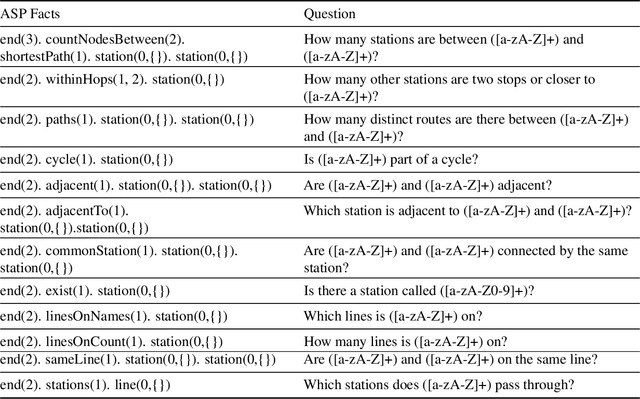


Abstract:Visual Question Answering (VQA) is a challenging problem that requires to process multimodal input. Answer-Set Programming (ASP) has shown great potential in this regard to add interpretability and explainability to modular VQA architectures. In this work, we address the problem of how to integrate ASP with modules for vision and natural language processing to solve a new and demanding VQA variant that is concerned with images of graphs (not graphs in symbolic form). Images containing graph-based structures are an ubiquitous and popular form of visualisation. Here, we deal with the particular problem of graphs inspired by transit networks, and we introduce a novel dataset that amends an existing one by adding images of graphs that resemble metro lines. Our modular neuro-symbolic approach combines optical graph recognition for graph parsing, a pretrained optical character recognition neural network for parsing labels, Large Language Models (LLMs) for language processing, and ASP for reasoning. This method serves as a first baseline and achieves an overall average accuracy of 73% on the dataset. Our evaluation provides further evidence of the potential of modular neuro-symbolic systems, in particular with pretrained models that do not involve any further training and logic programming for reasoning, to solve complex VQA tasks.
* In Proceedings ICLP 2024, arXiv:2502.08453. This work was partially funded from the Bosch Center for AI
Declarative Knowledge Distillation from Large Language Models for Visual Question Answering Datasets
Oct 12, 2024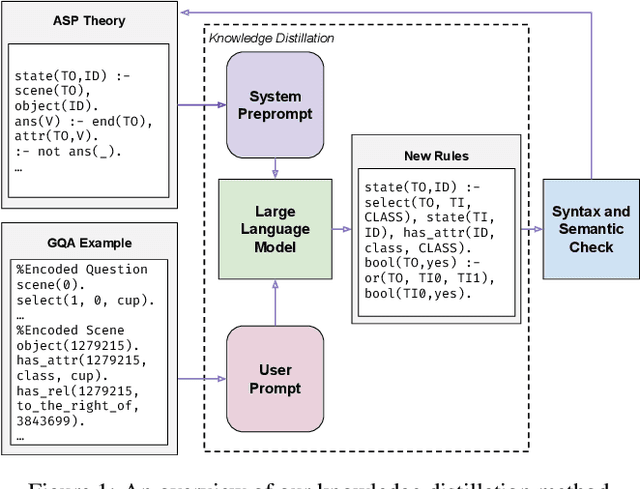
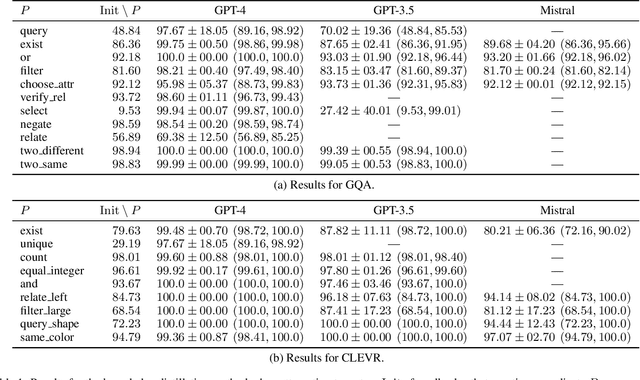
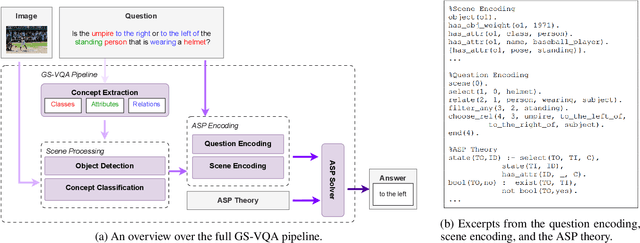

Abstract:Visual Question Answering (VQA) is the task of answering a question about an image and requires processing multimodal input and reasoning to obtain the answer. Modular solutions that use declarative representations within the reasoning component have a clear advantage over end-to-end trained systems regarding interpretability. The downside is that crafting the rules for such a component can be an additional burden on the developer. We address this challenge by presenting an approach for declarative knowledge distillation from Large Language Models (LLMs). Our method is to prompt an LLM to extend an initial theory on VQA reasoning, given as an answer-set program, to meet the requirements of the VQA task. Examples from the VQA dataset are used to guide the LLM, validate the results, and mend rules if they are not correct by using feedback from the ASP solver. We demonstrate that our approach works on the prominent CLEVR and GQA datasets. Our results confirm that distilling knowledge from LLMs is in fact a promising direction besides data-driven rule learning approaches.
Deontic Paradoxes in ASP with Weak Constraints
Aug 30, 2023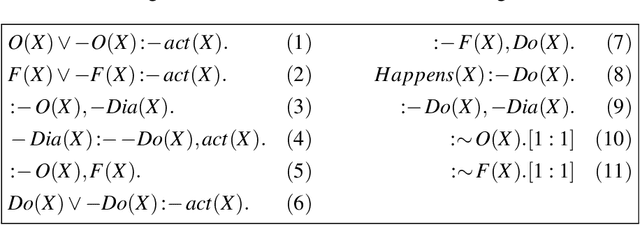
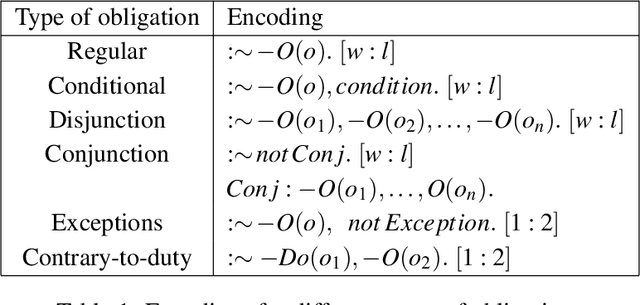
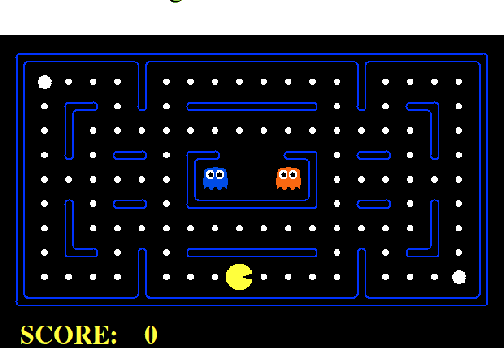

Abstract:The rise of powerful AI technology for a range of applications that are sensitive to legal, social, and ethical norms demands decision-making support in presence of norms and regulations. Normative reasoning is the realm of deontic logics, that are challenged by well-known benchmark problems (deontic paradoxes), and lack efficient computational tools. In this paper, we use Answer Set Programming (ASP) for addressing these shortcomings and showcase how to encode and resolve several well-known deontic paradoxes utilizing weak constraints. By abstracting and generalizing this encoding, we present a methodology for translating normative systems in ASP with weak constraints. This methodology is applied to "ethical" versions of Pac-man, where we obtain a comparable performance with related works, but ethically preferable results.
* In Proceedings ICLP 2023, arXiv:2308.14898
Contextual Reasoning for Scene Generation (Technical Report)
May 03, 2023Abstract:We present a continuation to our previous work, in which we developed the MR-CKR framework to reason with knowledge overriding across contexts organized in multi-relational hierarchies. Reasoning is realized via ASP with algebraic measures, allowing for flexible definitions of preferences. In this paper, we show how to apply our theoretical work to real autonomous-vehicle scene data. Goal of this work is to apply MR-CKR to the problem of generating challenging scenes for autonomous vehicle learning. In practice, most of the scene data for AV learning models common situations, thus it might be difficult to capture cases where a particular situation occurs (e.g. partial occlusions of a crossing pedestrian). The MR-CKR model allows for data organization exploiting the multi-dimensionality of such data (e.g., temporal and spatial). Reasoning over multiple contexts enables the verification and configuration of scenes, using the combination of different scene ontologies. We describe a framework for semantically guided data generation, based on a combination of MR-CKR and Algebraic Measures. The framework is implemented in a proof-of-concept prototype exemplifying some cases of scene generation.
Answer-Set Programming for Lexicographical Makespan Optimisation in Parallel Machine Scheduling
Dec 18, 2022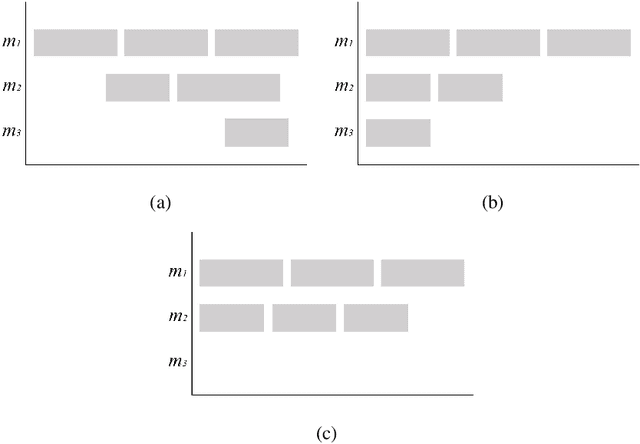

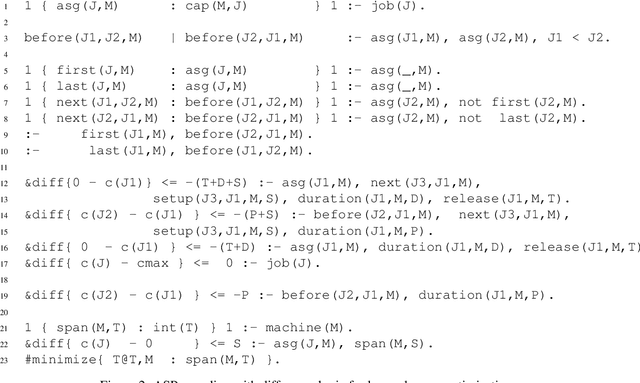

Abstract:We deal with a challenging scheduling problem on parallel machines with sequence-dependent setup times and release dates from a real-world application of semiconductor work-shop production. There, jobs can only be processed by dedicated machines, thus few machines can determine the makespan almost regardless of how jobs are scheduled on the remaining ones. This causes problems when machines fail and jobs need to be rescheduled. Instead of optimising only the makespan, we put the individual machine spans in non-ascending order and lexicographically minimise the resulting tuples. This achieves that all machines complete as early as possible and increases the robustness of the schedule. We study the application of Answer-Set Programming (ASP) to solve this problem. While ASP eases modelling, the combination of timing constraints and the considered objective function challenges current solving technology. The former issue is addressed by using an extension of ASP by difference logic. For the latter, we devise different algorithms that use multi-shot solving. To tackle industrial-sized instances, we study different approximations and heuristics. Our experimental results show that ASP is indeed a promising KRR paradigm for this problem and is competitive with state-of-the-art CP and MIP solvers. Under consideration in Theory and Practice of Logic Programming (TPLP).
A Neuro-Symbolic ASP Pipeline for Visual Question Answering
May 16, 2022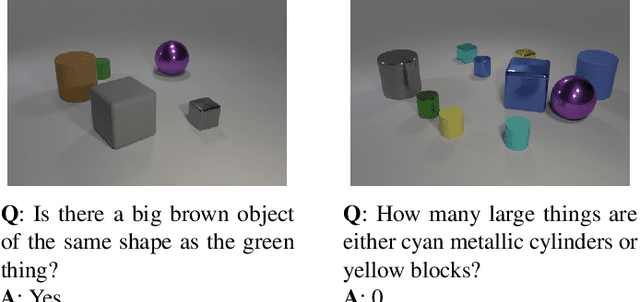

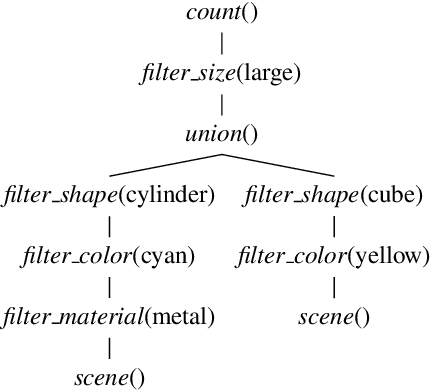
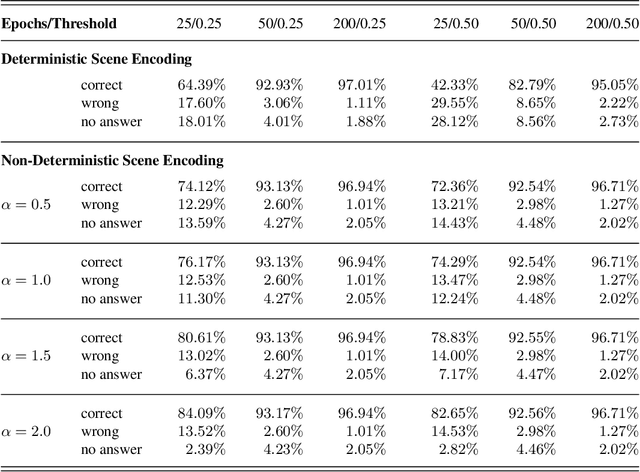
Abstract:We present a neuro-symbolic visual question answering (VQA) pipeline for CLEVR, which is a well-known dataset that consists of pictures showing scenes with objects and questions related to them. Our pipeline covers (i) training neural networks for object classification and bounding-box prediction of the CLEVR scenes, (ii) statistical analysis on the distribution of prediction values of the neural networks to determine a threshold for high-confidence predictions, and (iii) a translation of CLEVR questions and network predictions that pass confidence thresholds into logic programs so that we can compute the answers using an ASP solver. By exploiting choice rules, we consider deterministic and non-deterministic scene encodings. Our experiments show that the non-deterministic scene encoding achieves good results even if the neural networks are trained rather poorly in comparison with the deterministic approach. This is important for building robust VQA systems if network predictions are less-than perfect. Furthermore, we show that restricting non-determinism to reasonable choices allows for more efficient implementations in comparison with related neuro-symbolic approaches without loosing much accuracy. This work is under consideration for acceptance in TPLP.
Chasing Streams with Existential Rules
May 04, 2022
Abstract:We study reasoning with existential rules to perform query answering over streams of data. On static databases, this problem has been widely studied, but its extension to rapidly changing data has not yet been considered. To bridge this gap, we extend LARS, a well-known framework for rule-based stream reasoning, to support existential rules. For that, we show how to translate LARS with existentials into a semantics-preserving set of existential rules. As query answering with such rules is undecidable in general, we describe how to leverage the temporal nature of streams and present suitable notions of acyclicity that ensure decidability.
 Add to Chrome
Add to Chrome Add to Firefox
Add to Firefox Add to Edge
Add to Edge